Ukraine has abruptly ditched its plans to sign a historic pact with the European Union aimed at shifting the country out of the Kremlin's orbit. The decision handed victory to President Vladimir Putin in the increasingly vicious tug of war between Russia and the west for Ukraine's future, and looked like turning a special EU summit next week focused on Ukraine into a debacle.
President Viktor Yanukovych ordered the suspension of preparations for the pact between Kiev and Brussels after talks between the Russian and Ukrainian prime ministers – and after Yanukovych's party in parliament rejected six bills aimed at meeting the EU's terms.
The sudden switch by Yanukovych following weeks of brinkmanship left European policy towards the post-Soviet states to its east in tatters.
Following talks between the Russian and Ukrainian prime ministers, a government decree curtly suspended preparations for the signing of a trade pact and political association agreement between Ukraine and the EU at a summit next week in Lithuania.
The pact has been years in the making and was to have been the centrepiece of Lithuania's current rotating presidency of the EU.
Senior EU officials conceded there would be no signing in Vilnius, the Lithuanian capital. Instead, the Ukrainian government announced that it was "renewing dialogue" with Moscow on trade and economic matters and with the Kremlin's embryonic rival to the EU, the Eurasian customs union.
"We welcome the desire to improve and develop trade and economic cooperation [with Russia]," Putin's spokesman, Dmitry Peskov, said of Kiev's u-turn, describing Ukraine as "a close partner".
The decision was preceded by a big snub to the EU when the parliament in Kiev rejected six pieces of legislation aimed at meeting the EU's main terms for the deal, concerning the release from prison of the former prime minister, Yulia Tymoshenko, and allowing her to move to Germany, ostensibly for treatment.
President Yanukovych's Party of the Regions refused to vote on all six bills, ensuring defeat.
The Ukrainian volte face came as a humiliation to senior EU envoys. The EU's enlargement commissioner, Stefan Fuele, cancelled a scheduled visit to Kiev. On Wednesday he had said he was looking forward to the parliament passing the necessary legislation.
Carl Bildt, the Swedish foreign minister, who along with his Polish counterpart, Radek Sikorski, has been among the keenest supporters of Ukrainian integration with the EU, called the showdown a victory for Putin.
"Ukraine government suddenly bows deeply to the Kremlin. Politics of brutal pressure evidently works," he tweeted. Sikorski said Yanukovych could yet change his mind.
Following a secret meeting last week between Putin and Yanukovych, the Ukrainian prime minister, Mykola Azarov, went to St Petersburg on Wednesday to see Dmitry Medvedev, the Russian prime minister. Azarov described the talks as "one of the most productive meetings". The government then said the preparations for the EU summit were being frozen "in the national interest".
With the Ukrainian decision taken, Putin then announced that he had nothing against the pact with the EU.
But the opposition in Kiev was outraged and has called a big pro-European demonstration for the weekend. Opinion polls show a plurality in favour of the deal with the EU.
"A state treason occurred today," said Oleksiy Kaida of the opposition Svoboda party.
Money, trade, bullying and the fortunes of Ukrainian politicians and oligarchs are certain to have played a central role in Yanukovych's calculation, with Russia, Ukraine's largest trading partner, warning of dire consequences if Kiev sided with the EU.
The government called for all three sides to study the "recovery of lost production output as well as trade and economic relations".
"Those in power showed that they are not willing to quarrel with Russia," said Vadym Karasiov, head of the Institute of Global Strategies in Kiev.
The EU's losing battle for Ukraine is likely to encourage the Kremlin in its view that Europe is weak and divided and lacks foreign policy muscle. In September Armenia succumbed to Russian pressure and turned its back on years of negotiations with the EU in a move that stunned Brussels.
At stake was a trade agreement and a political association deal stemming from 2005 when the EU launched its "eastern neighbourhood policy" offering trade and political benefits to post-Soviet states traditionally falling within Moscow's orbit. The neighbourhood policy does not offer eventual membership of the EU or negotiations to join. Moldova and Georgia are expected to sign agreements with the EU.
Of the four countries, Ukraine is the main prize because of its size, its geography and its history. Putin has appeared to view the contest for Ukraine as a zero sum game between Russia and the west, and has been tightening Russia's trade screws on Ukraine and the other countries.
The main terms for a breakthrough concerned what the EU calls an end to "selective justice" in Ukraine, meaning that the courts and the judiciary are manipulated for political and business reasons. The touchstone for these criteria was the fate of Tymoshenko, with Germany insisting she be allowed to leave the country, while others such as France and Poland argue that the prospects for such a geo-strategic shift in Russia's backyard should not be tied to the fate of a single individual.
Some diplomats and officials in Brussels, while dismayed by the serial negative signals from Yanukovych in recent weeks, remained nonetheless hopeful that the president was bluffing, seeking to extract better terms from the EU and could yet yield at the last minute in Vilnius, issuing a presidential pardon for Tymoshenko.
"We deplore the pressure and blackmailing tactics that Russia has used against Ukraine, and other countries," said Hannes Swoboda, leader of the social democrats in the European Parliament. "It is equally deplorable that Ukraine seems to have given in to this pressure."
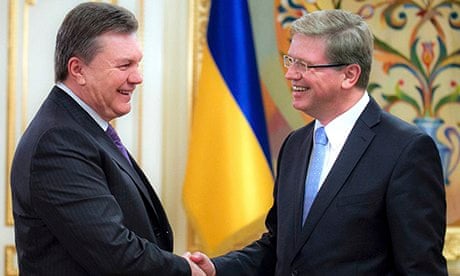
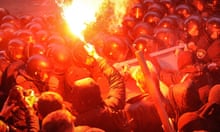
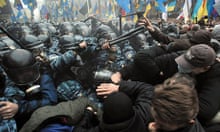
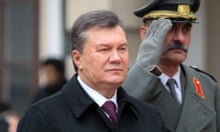
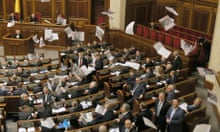
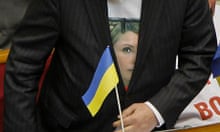
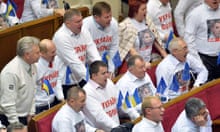
Comments (…)
Sign in or create your Guardian account to join the discussion